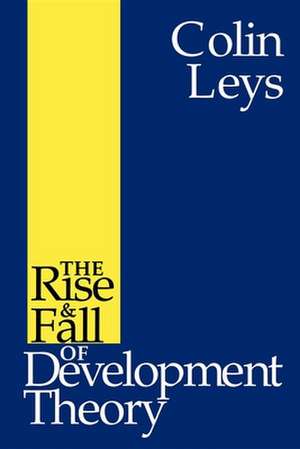The Rise and Fall of Development Theory
Autor Colin Leysen Limba Engleză Paperback – 30 apr 2009
"He has this wonderful and rare capacity to delineate the most complex of arguments in the most limpid prose. He never takes refuge in jargon. He demolishes pretentiousness. He is disarmingly honest. He hits you between the eyes. He is not afraid to be a lone voice as, increasingly, nowadays he is, the still small voice of humane sanity in an increasingly barbarous and market-oriented world. He makes immediate sense to anybody voting marginally to the left of Genghis Khan, Mrs. Thatcher or Newt Gingrich." John Lonsdale, Fellow of Trinity College, Cambridge.
This book is a "stock-taking" of development theory at the end of the 20th century. It argues that the assumptions on which development theory has rested since the 1950s no longer hold. The postcolonial "third world" for which development theory was originally developed has fractured into increasingly diverse regions, while the end of the postwar regime of regulated international trade and capital movements has drastically curtailed the scope for state economic intervention. A much broader based, more historical and more explicitly political theoretical effort is now called for."
Preț: 169.60 lei
Nou
32.46€ • 35.27$ • 27.29£
Carte tipărită la comandă
Livrare economică 21 aprilie-05 mai
Specificații
ISBN-10: 025321016X
Pagini: 216
Dimensiuni: 155 x 234 x 18 mm
Greutate: 0.35 kg
Editura: Indiana University Press
Notă biografică
Textul de pe ultima copertă
Cuprins
I. Development Theory
1. The Rise and Fall of Development Theory
2. Underdevelopment and Dependency
3. Samuel Huntington and the End of Classical Modernization Theory
4. Conflict and Convergence in Development Theory
II. Development Theory and Africa
5. African Economic Development in Theory and Practice
6. The State and the Crisis of Simple Commodity Production in Africa
7. The Kenya Debate
8. The Kenya Debate Ten Years On
9. From Ghana to Namibia: The Meaning of African Independence
Index
